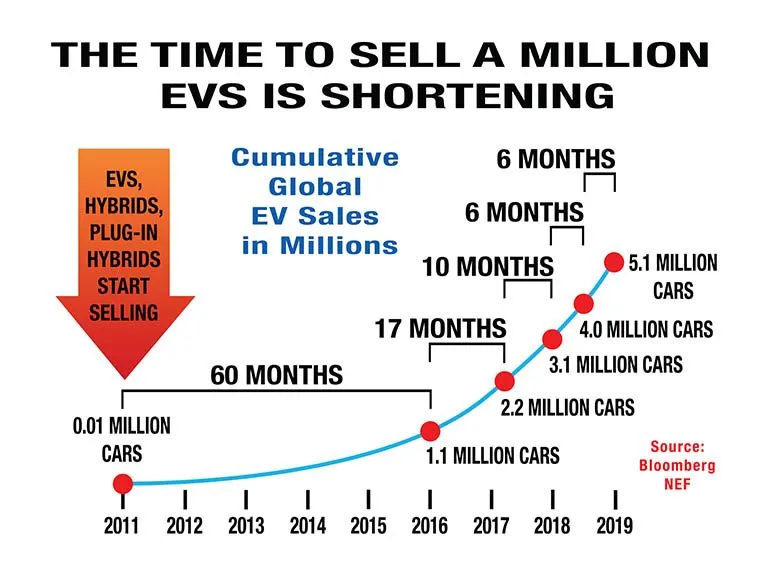
5 Million EVs sold globally; the fifth million took only 6 months!
There are now more than 5 million EVs worldwide. The fifth million took just six months, proving electric vehicle sales are exponential; the numbers are doubling and occur must faster now. Welcome to the Electric Vehicle Era! In case you haven't noticed, e-Mobility is approaching warp speed.
By John Coulter, Current EV CMO
Steve Hanley / Cleantechnica.com: “It took 60 months for the first million EVs to find buyers. The time needed to reach successive sales marks is shrinking. It took 17 months to get from 1 million to 2 million and only 10 months to get from 2 million to 3 million.”
The France-based International Energy Agency (IEA) says: “The global electric car fleet exceeded 5.1 million in 2018, up by 2 million since 2017, almost doubling the unprecedented amount of new registrations in 2017. The People’s Republic of China remained the world’s largest electric car market with nearly 1.1 million electric cars sold in 2018 and, with 2.3 million units, it accounted for almost half of the global electric car stock. Europe followed with 1.2 million electric cars and the United States with 1.1 million on the road by the end of 2018 and market growth of 385,000 and 361,000 electric cars from the previous year. Norway remained the global leader in terms of electric car market share at 46% of its new electric car sales in 2018, more than double the second-largest market share in Iceland at 17% and six-times higher than the third-highest Sweden at 8%.”
Electric vehicles are on a breathtaking trajectory in a growing number of countries around the world. After reaching the first million sales in 2015 over the course of around 60 months, the time it took to reach the next million electric vehicles dramatically decreased. The second million took 17 months; the third million took ten months.
By the start of 2018 – when the three-millionth EV was sold – around 35 per cent of cumulative EV sales were in China, and it took only six months to chalk up another million, which totaled 4 million globally.
BNEF expects the next million sales of EVs to take just over 6 months, with the five-millionth vehicle sold in 2019.
Mark Kane, from insideevs.com says: “Plug-in electric car sales around the world are increasing at a more than healthy pace of 83% year-over-year, reaching sales of about 153,695 in January of 2019 – a 1.9% market share.” Discussing February 2019 sales, he says: “All-electric cars took a 72% share of the plug-in car sales this past month at a growth rate of 143% year-over-year, which means that plug-in hybrids are now left behind.”
China has played a major role in reaching these milestones, and is responsible for around 37% of passenger EV sales since 2011 and for about 99% of e-buses.
An increase in the amount and kinds of EVs being produced by different car makers is speeding things up –particularly electric vehicles in the median price range.
Of upcoming EV sales, BNEF says it expects just under half – 42% – to be in China, while Europe is forecast to contribute 26% and North America 2%.
Steve Hanley: “BNEF expects California to continue leading the way in the US market. EVs — again, that means including hybrids in this analysis — are already about 10% of sales in the Golden State, but the data shows an interesting change in buying habits. Where once the hybrids led the way, plug-in hybrids and battery electric cars are now outselling hybrids. We have Tesla and the arrival of the Model 3 to thank for that. “Californians will soon be presented with compelling, cost-competitive electric vehicles of many different types. Those factors will probably drive sales up significantly,” says BNEF.”
By 2025, EV sales across the world are set to increase ten-fold, to 11 million. In China, EVs will account for 19% of all passenger vehicle sales, compared to 14% in Europe and 11% in the US, according to Bloomberg's Electric Vehicles Outlook 2018.
By 2040, it is estimated that 200 million EVs will be on China’s roads, accounting for 60% of its vehicles. Globally, this figure will be 559 million – a third of all cars. At this point, electric cars and buses will be displacing an estimated 7.3 million barrels of transport fuel every day.
Recent Posts
- The 2022 Audi Q4 e-Tron SUV combines performance, practicality and luxury
- Ford's 2022 F150 Lightning All-Electric Truck is in high demand
- Legendary Audi performance is at the heart of the 2022 Audi e-tron GT and its RS sibling.
- Meet the Lexus RZ 450e – the luxury brand’s 1st EV
- The 2022 GV60 is Genesis’ first all-electric vehicle

